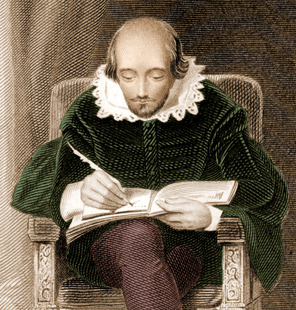Happy birthday, William Shakespeare! The bard on freedom, imitation, and coronavirus
Thursday, April 23rd, 2020It’s Shakespeare’s birthday, so it only seems appropriate that we baked him a little cake. There’s an even better way to celebrate, however, and that’s to bring our readers’ attention to Scott Newstok‘s How to Think Like Shakespeare, just published by Princeton University Press.
Newstok’s thing is education, and contrary to all-too-commonly held views, Shakespeare got a top-notch one. Newstok outlines the basic principles Shakespeare learned in a Chronicle of Higher Education essay: a grounding in rhetoric (which has gotten a rather bad name in our time), imitation, inventio, traditio. (Well, honestly, they’ve all gotten a bad name.)
On rhetoric:
Antonio Gramsci described education in this way: “One has to inculcate certain habits of diligence, precision, poise (even physical poise), ability to concentrate on specific subjects, which cannot be acquired without the mechanical repetition of disciplined and methodical acts.” You take it for granted that Olympic athletes and professional musicians must practice relentlessly to perfect their craft. Why should you expect the craft of thought to require anything less disciplined? Fierce attention to clear and precise writing is the essential tool for you to foster independent judgment. That is rhetoric.
On imitatio:
 As Michel de Montaigne put it: “The bees steal from this flower and that, but afterward turn their pilferings into honey, which is their own. … So the pupil will transform and fuse together the passages that he borrows from others, to make of them something entirely his own; that is to say, his own judgment. His education, his labor, and his study have no other aim but to form this.”
As Michel de Montaigne put it: “The bees steal from this flower and that, but afterward turn their pilferings into honey, which is their own. … So the pupil will transform and fuse together the passages that he borrows from others, to make of them something entirely his own; that is to say, his own judgment. His education, his labor, and his study have no other aim but to form this.”
To add to our little mini-celebration, here’s an excerpt from Newstok’s interview with Scott Jaschik‘s over at the current Inside Higher Education:
Q: And on freedom?
A: When Caliban cries out for freedom, he falls for a drunk Stephano, who sings, “Thought is free.” Yet at this moment, Caliban’s not free — he’s just transferred his bondage to “a new master.” Real freedom would demand not only being slave to no one, but being his own master.
I’ve come to believe that a better translation of the emancipatory artes liberales would be the “crafts of freedom.” These practices cultivate a thinking citizen — the bane of every despot. Such an educational program presumes that freedom is fragile, demanding endless exertion: “there is nothing more arduous than the apprenticeship of liberty.”
I end the book with the fantastic James Baldwin essay “Why I Stopped Hating Shakespeare,” which concludes, “My relationship, then, to the language of Shakespeare revealed itself as nothing less than my relationship to myself and my past.” At first, Baldwin sought freedom from having to read Shakespeare, yet he came to relish the freedom to make Shakespeare his own. In doing so, Baldwin achieved a mutual recognition in Shakespeare that few of us ever reach – “an inner freedom which cannot be attained in any other way” than by inhabiting other minds through art.
Q: What do you think your book can offer today, when we are focused on the coronavirus?
A: That’s kind of an up-to-the-minute version of the utility question, isn’t it? We quickly exhausted the “What Shakespeare Did During the Plague” takes. The plaintive cry of Sonnet 65 comes to mind:
How with this rage shall beauty hold a plea,
Whose action is no stronger than a flower?
I’m starting to feel like the crisis has given us a kind of X-ray into everyone’s souls. To cite one of countless examples I’d never thought I’d see laid so bare: Do you think the postal service should be privatized, or are you grateful for its countless daily decencies? In terms of education, would you cheer if half of all universities went bankrupt, or do you cherish close learning? Should we only read contemporary prose, or might poets from the past have something to offer us?
 On a more mundane level: my chapters are mercifully short, well suited to “this distracted globe”! And the book’s packed with apt quotations. At the least, they might provide a momentary stay against confusion; at best, an inspiration to seek out “the treasures that prevail,” a handbook for what matters once we emerge from the wreckage.
On a more mundane level: my chapters are mercifully short, well suited to “this distracted globe”! And the book’s packed with apt quotations. At the least, they might provide a momentary stay against confusion; at best, an inspiration to seek out “the treasures that prevail,” a handbook for what matters once we emerge from the wreckage.
Oh yes, the cake… we just pulled it out of the oven!









